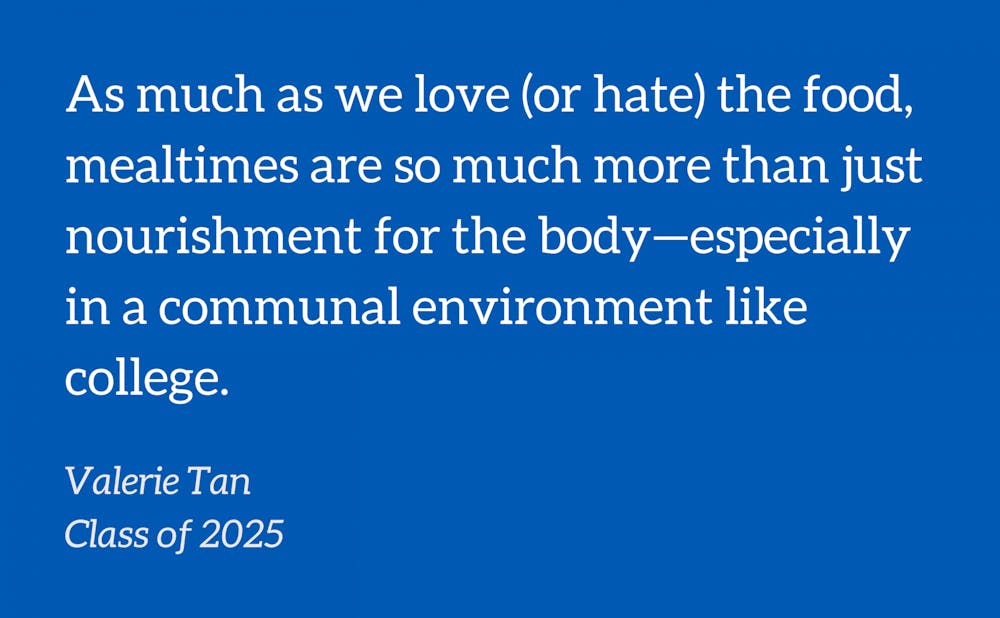For most Duke students, dining at Marketplace is a cornerstone of the freshman experience. As much as we love (or hate) the food, mealtimes are so much more than just nourishment for the body—especially in a communal environment like college. From the moment we step through those glass doors, we are presented with a series of social decisions: how we interact with the staff members, whether to strike conversations with random strangers or familiar faces while standing in line, where we have our meals and whom we eat with. They might seem trivial in the moment but the choices we make, subconsciously or otherwise, can go a long way towards shaping the relationships we have with others—and ourselves.
Amidst the hustle and bustle of college life, mealtimes are sacred windows of socialization. Unlike in high school, when taking the same classes or having classes at the same timings as friends was almost always a given, everyone operates on vastly different schedules in college. Apart from the low-hanging fruit of friendships borne out of circumstance, forging meaningful and lasting friendships requires conscious effort on both ends to achieve even the bare minimum of being in the same place at the same time. In this context, Marketplace meals could not serve as a more powerful unifying force for friends to gather. After all, even the most time-starved overachiever needs to eat and—perhaps more importantly—nobody particularly relishes the prospect of letting those precious food swipes go to waste. Some people I met during orientation week have schedules that are so incongruous with mine that chance encounters in Marketplace and the fleeting conversations that ensue are our best bet for having prolonged interactions with each other. Even among close friends, gathering around the breakfast or dinner table is an important and convenient means of solidifying friendships that are largely still in their nascence two months into college. Naturally, our choices of dining partners can have a significant bearing on the friend circles we eventually integrate into, especially during freshman fall, when social networks are very much still fluid and in flux.
For all the social benefits of eating with friends, choosing to eat alone is a bold, at times necessary step towards self-care that I personally strongly advocate as an introvert. Going from spending most of the day alone in my bedroom to being surrounded by peers almost all the time has been one of the most drastic transitions I’ve faced coming into college as a gap year student. Others probably share the same sentiments, given that virtual schooling warranted by the pandemic kept us apart. The constant social stimulation is exhausting as it is exhilarating. But separation anxiety—or the fear of missing out (FOMO)—drives me to socialize against my better judgment, leaving my senses perpetually overwhelmed and my social battery depleted as soon as it recharges. As though it weren’t already difficult enough for us busy Duke students to make time for ourselves, the communal setting of college perpetuates the idea that whatever precious time we can spare should be devoted towards socialization—especially when we are just at the beginning of our college lives. We simultaneously yearn for and shudder at solitude, desperately needing some time alone but also fearing ostracization for abstaining from group activities.
It was in solitary dining that I found my much-needed time and space for introspection and recovery. On certain days (when my sleep schedule permits), I wake up early and head to Marketplace at the opportune timing—right after the 8:30 crowd dissipates and just before the 10:15 scramble begins. It is a strategic decision that minimizes the likelihood of running into a friend or acquaintance so I can spare myself from the obligatory small talk and polite exchanges and avoid the guilt of shying away from invitations to dine together. By creating a socially acceptable and plausible excuse for me to eat alone, the ban on indoor group dining has worked in my favor. It has allayed my fears of being labeled as antisocial and made me feel less out of place in the distant company of fellow solo diners, a sense of solidarity arising from our shared desire to be alone. My peaceful, solitary meals give me space to process and organize my thoughts and emotions, rejuvenating my mind in preparation for the day’s impending tasks.
Evidently, the decisions we college students make regarding our meals, subconsciously or otherwise, are not as straightforward as they seem. They are reflections of our priorities and personalities and play a significant role in shaping our relations with others and ourselves. Although we hardly question it, the whole concept of Marketplace as a dining hub reserved exclusively for freshmen has made it a lot easier for us to find our tribe. It is a uniquely Duke experience—and one that I am thankful for, especially as the resurging pandemic continues to imperil this communal dining arrangement.
Valerie Tan is a Pratt first-year. Her column runs on alternate Fridays.
Get The Chronicle straight to your inbox
Signup for our weekly newsletter. Cancel at any time.
Valerie Tan is a Pratt junior and an opinion managing editor of The Chronicle's 119th volume.

